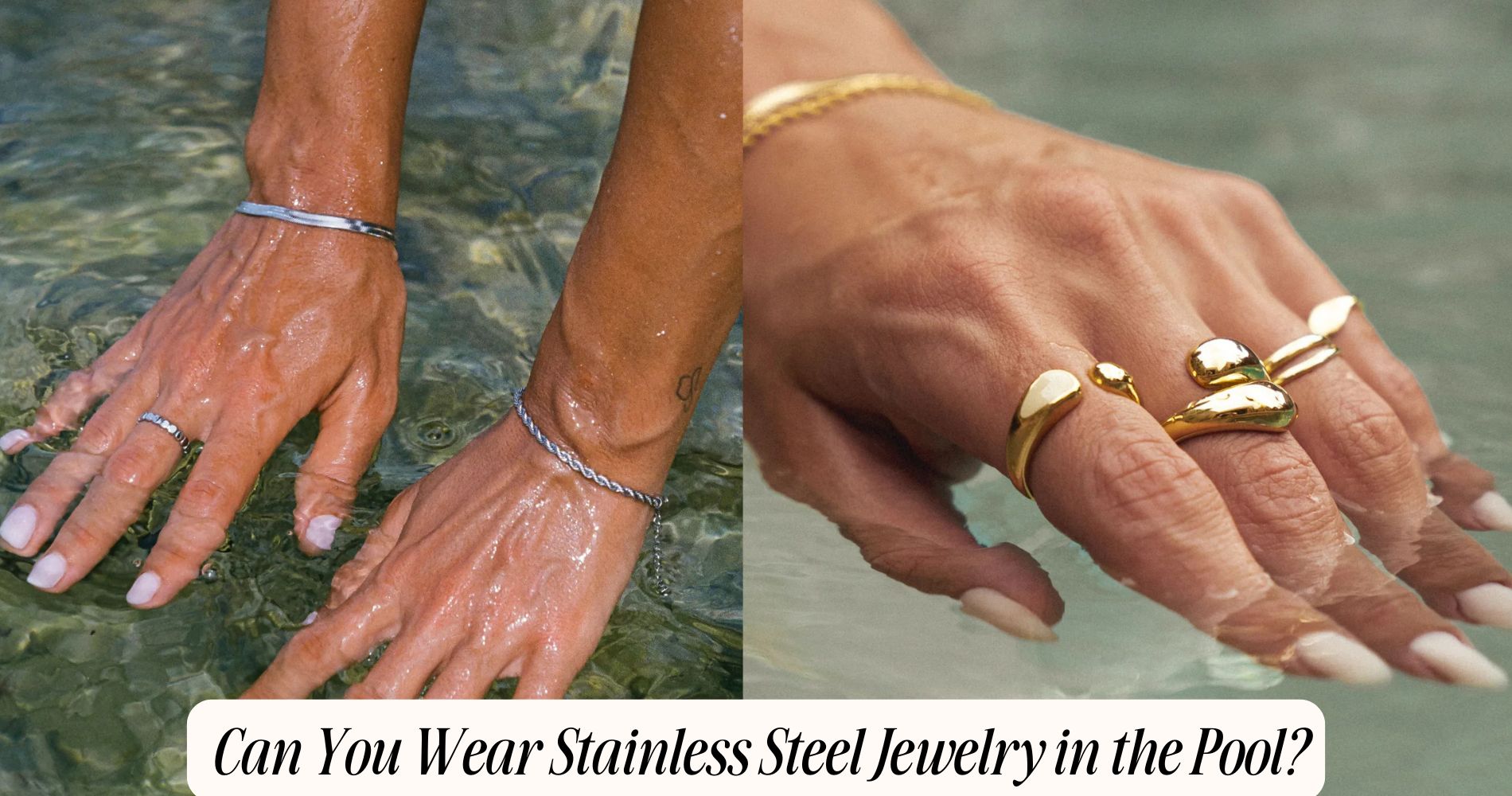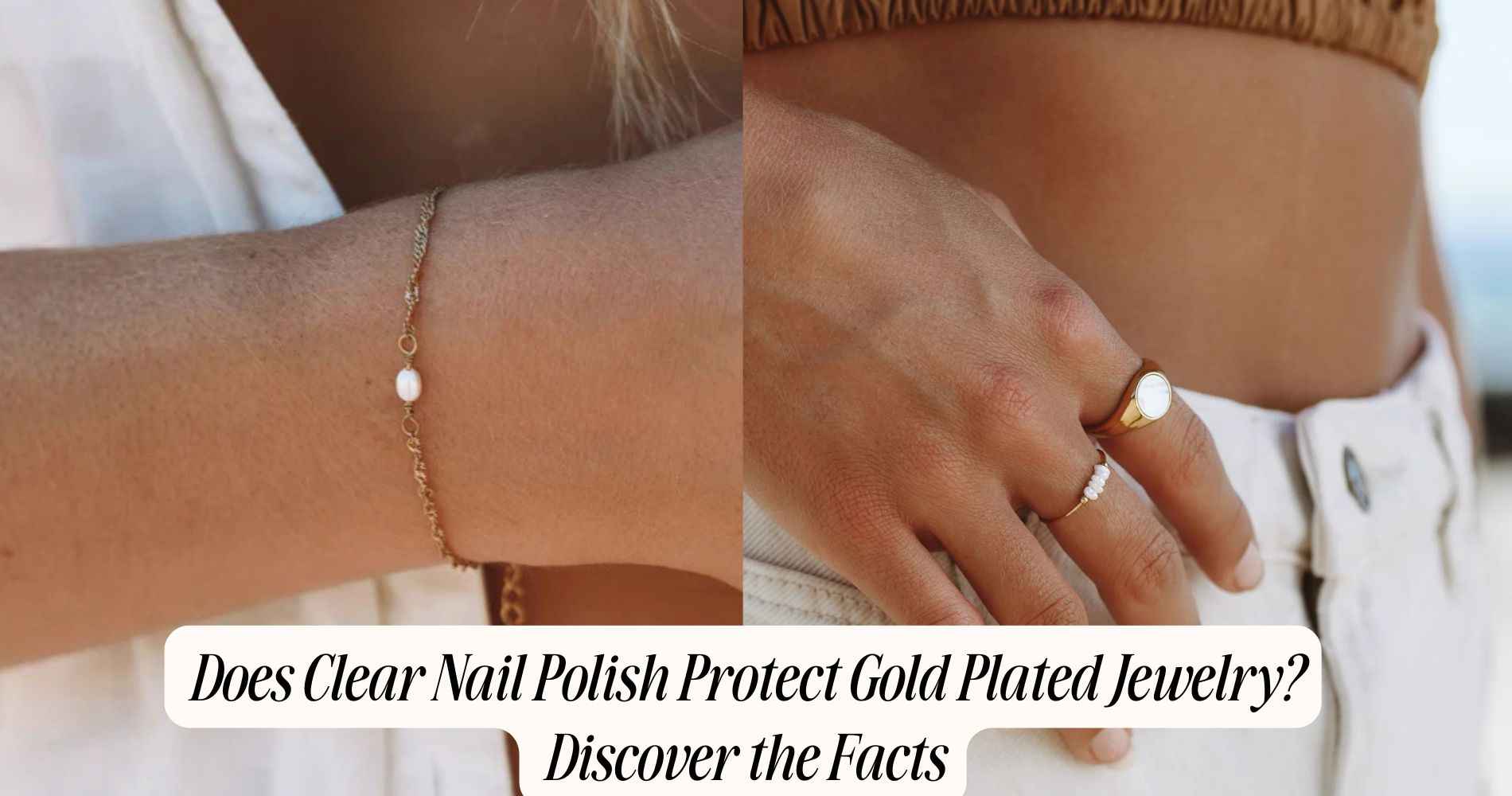
Can You Wear Stainless Steel Jewelry in the Pool?
Can you wear stainless steel jewelry in the pool? Yes, you can! Stainless steel jewelry is durable and resistant to rust, thanks to its chromium content. However, while it stands up better to water than gold or silver, chlorine can still dull its shine and cause discoloration over time. Repeated exposure may also weaken links and settings. To keep your pieces looking their best, rinse them with fresh water after swimming. This simple step helps maintain their appearance and prolongs their lifespan. Looking for stylish and resilient options? Check out our stainless steel jewelry collection for water-resistant designs perfect for everyday wear.
Properties of Stainless Steel
Stainless steel is renowned for its unique blend of durability and resistance, making it an ideal choice for jewelry, especially for those who enjoy activities like swimming.
Its alloy composition, primarily consisting of iron, chromium, and nickel, contributes greatly to its strength and aesthetic appeal. The presence of chromium enhances corrosion resistance, forming a protective layer that prevents rust and tarnishing. This property is particularly beneficial when exposed to chlorinated water in pools, as it minimizes the risk of damage.
Additionally, stainless steel's resilience guarantees it withstands daily wear and tear, making it a reliable option for active lifestyles.
Effects of Chlorine on Jewelry
Although chlorine is effective for keeping pools clean, its impact on jewelry can be significant. When you expose your jewelry to chlorine, it can lead to corrosion and tarnishing, particularly if the jewelry isn't made from durable materials.
Chlorine exposure can weaken metal links and settings, reducing their overall jewelry durability. For example, gold and silver are more susceptible to damage from chlorine compared to stainless steel. However, even stainless steel isn't completely immune; over time, repeated exposure may affect its shine and luster.
To prolong the life of your jewelry, it's wise to remove it before swimming. This simple step can help maintain its appearance and structural integrity, allowing you to enjoy your pieces for years to come.
Swimming Pool vs. Ocean Water
When comparing the effects of swimming pool water to ocean water on jewelry, it's essential to take into account the differences in their chemical compositions.
Pool water typically contains chlorine, which can affect the surface of your stainless steel jewelry, leading to potential discoloration or dullness.
On the other hand, ocean water contains salt, which can cause corrosion over time, especially with prolonged water exposure.
When it comes to pool safety, it's wise to rinse your jewelry after swimming in chlorinated water to minimize any adverse effects.
While stainless steel is generally resilient, understanding these differences can help you make informed decisions about when to wear your jewelry.
Ultimately, maintaining your pieces will guarantee they last longer, regardless of the water type.
Care Tips for Stainless Steel
Caring for your stainless steel jewelry is essential to maintaining its luster and longevity. To keep your pieces looking their best, use gentle cleaning methods. A simple solution of warm water and mild soap works wonders. Soak your jewelry for a few minutes, then gently scrub with a soft toothbrush to remove any dirt or grime. Rinse thoroughly and pat dry with a soft cloth.
For maintenance tips, avoid exposing your jewelry to harsh chemicals, such as chlorine or bleach, as they can damage the finish.
Store your pieces in a dry place, preferably in a soft pouch or separate compartments to prevent scratches. Regularly check for signs of wear, and you'll guarantee your stainless steel jewelry stays beautiful for years to come.
Alternatives to Stainless Steel Jewelry
If you're exploring options beyond stainless steel jewelry, several materials offer their own unique benefits and aesthetic appeal.
Gold jewelry is a classic choice, known for its timeless elegance and resistance to tarnishing. It comes in various karats and colors, allowing you to find the perfect match for your style.
Alternatively, titanium accessories are gaining popularity due to their lightweight nature and exceptional durability. They're hypoallergenic, making them ideal for sensitive skin, and offer a modern, sleek look.
Both gold and titanium provide excellent options for those seeking something different without compromising on quality. Whether you prefer the luxurious feel of gold or the robust nature of titanium, you'll find alternatives that suit your preferences beautifully.
Frequently Asked Questions
Can Stainless Steel Jewelry Cause Skin Irritation in Pools?
Stainless steel jewelry typically doesn't cause skin irritation. However, if you have skin sensitivity, pool chemicals like chlorine might provoke reactions. It's wise to monitor your skin's response after exposure to both jewelry and pool environments.
Is It Safe to Wear Stainless Steel With Other Metals?
It's generally safe to wear stainless steel with other metals, but you should consider metal compatibility. Mixing different metals can lead to tarnishing or corrosion; proper jewelry care helps maintain their appearance and longevity.
How Can I Tell if My Stainless Steel Is High Quality?
To identify high-quality stainless steel, check the stainless steel grades. Look for 304 or 316; they're more corrosion-resistant. Also, inspect for a polished finish and weight—heavier pieces often indicate better quality.
Does Stainless Steel Jewelry Fade Over Time in Water?
Stainless steel jewelry generally maintains its appearance well, but exposure to water can affect its longevity. Regular stainless steel maintenance, like cleaning and avoiding harsh chemicals, helps prevent fading and keeps your jewelry looking great over time.
Can I Wear Stainless Steel Jewelry While Snorkeling?
You can wear stainless steel jewelry while snorkeling, but prioritize snorkeling safety. Rinse your jewelry afterward to maintain its shine and prevent any buildup from saltwater or sand, ensuring it lasts longer and looks great.
Conclusion
To summarize, you can wear stainless steel jewelry in the pool, as it's generally resistant to corrosion and tarnishing. However, prolonged exposure to chlorine can still cause some wear over time. Always rinse your jewelry after swimming to minimize any potential damage. Ultimately, proper care will help keep your jewelry looking its best, no matter where you swim.























Leave a comment
This site is protected by hCaptcha and the hCaptcha Privacy Policy and Terms of Service apply.